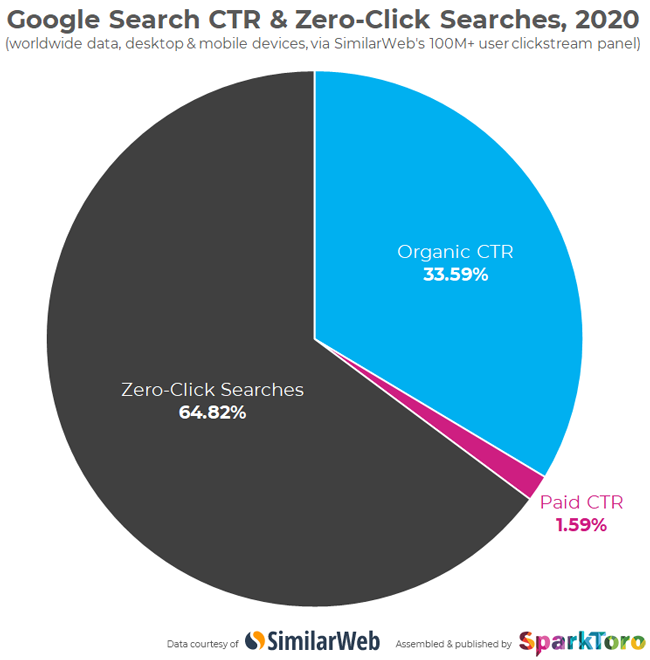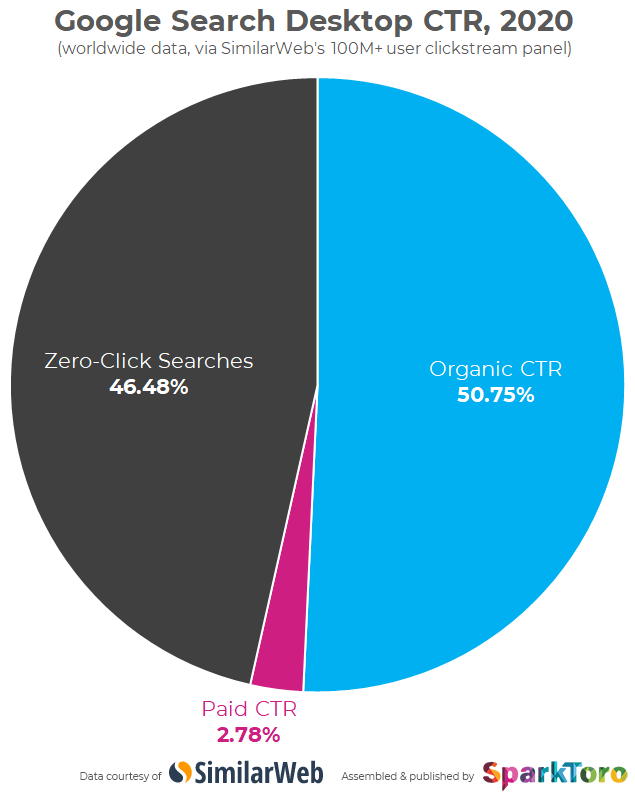Zero click trend is increasing: two out of three searches end on Google
Throughout 2020 nearly 65 percent of searches on Google ended on the same page as search results without even a click on another web property. The so-called zero-clicks trend on Google, or the phenomenon of searches with no clicks that therefore do not bring traffic to the sites, even though their pages have a high ranking in SERP, is confirmed.
The study on the zero-click trend in 2020
Providing the new data is the latest work of Rand Fishkin with Sparktoro, author of the previous monitoring, which explains that he analyzed a sample of 5.1 trillion searches on Google in 2020 through Similarweb.
And so, what strikes me is that “from January to December 2020, 64.82% of searches on Google (desktop and mobile combined) ended in search results without clicking on another web property“, and this number probably “underestimates some cell phone searches and almost all voice searches, and it is therefore likely that more than two-thirds of all Google searches are zero-click searches“.
Data are increasing compared to 2019
As mentioned, Fishkin had already published a similar analysis in the summer of 2019, later defining Google as the competitor of all sites precisely for this continuous erosion of clicks at the expense of the pages positioned.
That study – run through Jumpshot, clickstream data providers that then ceased activity – had shown that 50.33 percent of all Google searches ended without a click to any web properties in the results, and so in just under 18 months the trend became even more pronounced.
However, explains the SEO expert, the results of the two searches are not perfectly overlapping “because the clickstream data panel of Similarweb is different from that of Jumpshot”: for example, in the new study data come from all over the world, while with Jumpshot they were only related to the United States of Jumpshot; in addition, Similarweb combines mobile and desktop devices, including Apple /iOS devices, for which Jumpshot had no coverage.
However, Fishkin says that it is likely that “if the previous panel were still available, it would show a similar trend for Google’s increased cannibalization of clicks”.
The results of the research on Google’s click cannibalization
The article highlights the main statistics that emerged from the study, which allow us to understand the context and the situation of the zero-click trend:
- Similarweb analyzed over 5.1 trillion searches on Google in 2020, on a panel of over 100 million mobile and desktop devices from which Similarweb collects clickstream data.
- 33.59% of searches generated clicks on organic search results.
- 1.59% generated clicks on paid search results.
- In the remaining 64.82% users completed a search without a direct and subsequent click on another web property.
- One-click searches are much higher on desktop devices (50.75% organic CTR, 2.78% paid CTR).
- Click-free searches are much higher on mobile devices (77.22%).
What are the zero click searches
Fishkin also focused on the terminology “zero click”, which for some is slightly misleading “as it also includes a search that ends with a click within the same Google SERP“: in general, zero-click searches can mean that user queries are resolved directly on the results page.
But this sample also includes the cases of clicking on the animals’ lines or 3D images, or those on a phone number to call a local activity in the Maps pane, or even situations where a user – not having found what he is interested in – performs a second search by finishing the query.
In addition, these data confirm the impressions we had gained in the past months from the study on the position of organic results in Google Search, whose visibility is constantly decreasing due to the overcrowding of Big G features in SERPs.
The differences between organic CTR from mobile and from desktop
The most relevant breakdown is the separation between mobile CTR and desktop: from desktop (which, in this analysis, also includes larger laptops and tablets), in fact, the CTR is still over 50 percent, with a marginal share even for paid clicks – according to Fishkin, “in the United States these numbers could be higher, while in countries and regions with fewer advertisers and less dollar ad it is likely to be lower”.
Very different is the scenario seen from mobile, where instead the searches with zero clicks are clearly predominant and those that end with almost zero paid clicks.
For Fishkin, this shows that “Google’s efforts for a mobile-first search experience have paid huge dividends, responding to three-quarters of all mobile search queries without a click”.
The evolution of searches over time
The study also considered the temporal evolution of searches from January 2018 (the oldest data available on Similarweb for this project) to December 2020.
The trend over time is kind of irregular, but still offers a series of interesting cues:
- The overall search volume is growing, although the pandemic may be responsible for reversing the decline at the end of 2019.
- The paid search fee is clearly growing, both on mobile and desktop devices.
- Organic clicks grew in 2020 after a long standoff and a slight drop. This seems to result from the increase in desktop device usage in 2020 (again, due to the Covid-19 that has increased the use of such devices), and thus could again decline with the return to normality.
- The end of 2020 recorded the highest recorded share of zero-click searches.
Controversies on Google’s monopoly
At the bottom of the search, Fishkin does not neglect to dedicate a critical cue on the “monopoly power of Google”: in 2020, the search giant owned over 91 percent of the global market share worldwide and over 87 percent in the United States. In addition, as noted by a recent study by Groupm on the Wall Street Journal “Google also controls a huge share of all advertising in the United States, including over 95 percent of advertising associated with search and over 50 percent of display ads”. But, the author notes again, “Google / Alphabet intends to stop here” and has in its plans the replacement of third-party advertising cookies with a proprietary system owned by Google for aggregating user behavior, called FLoC, that “would give Google exclusive access to a ton of user data that the company already largely monopolizes“.
To Fishkin, this “domination is a frightening, but seemingly unstoppable perspective“: just like the GDPR “has prevented any European technology company from competing against US tech giants, even this privacy move seems to ensure that Google will own online advertising in search and the web (apart from Facebook / Amazon) for the near future”.
The critics to the study
There was also no lack of criticism of the methodology of the study, in fact, since – as Barry Schwartz notes – the analysis did not clearly identify the search intent of the research, therefore also grouping queries for which Google offers a definitive answer directly in SERP and that of course do not lead to further clicks.
That is to say, questions about weather, sports results, math and calculation operations, time information (also in other locations), today’s date, definitions or questions based on facts such as “how old is Obama”, which basically do not require (more) a click for years now because the very intention of the user is to get an immediate and specific response, which Google provides with its features, often directly in a box.
How to respond to the zero-click trend on Google
Going back to more SEO-related topics, the study reveals positive news and a series of negative news.
It is comforting that there are currently more searches on Google than ever and even more clicks available, with more opportunities for companies with which Google is not directly in competition; the critical aspect is that “in the last three years Google has been the main beneficiary of the increase in search volume worldwide”; in addition, “since the pandemic brings more people out of their laptops and desktops and brings them back to their mobile devices, the zero-click search problem is likely to rise even higher,” concludes Rand Fishkin.
The impact of click-free searches is not uniform across industries: companies in industries where Google competes with specific features, such as online travel agencies or review platforms, “may lose more traffic than other businesses”.
To try to counter the erosion of clicks the sites have some roads ahead, such as strengthening corporate branding, optimized management of featured snippets and the addition of the schema markup can help a company to improve awareness among users.
As Fishkin himself explained to Search Engine Land, “the detailed information that appears in Google’s results can be, like ads on billboards or press mentions, more difficult to monitor than website traffic, but still expose your brand name to an audience, to build familiarity and share information”. Therefore, “the brands that find the way to take advantage of this type of exposure in the SERP, even without a click, will be the ones that will win in this new form of SEO on-SERP”.







